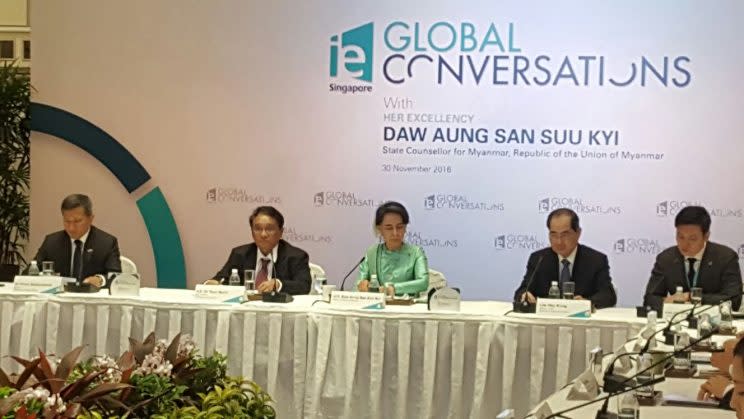Aung San Suu Kyi: Cautiously optimistic about Myanmar’s outlook

Myanmar leader Aung San Suu Kyi said Wednesday (30 November) that she is cautiously optimistic about the country’s future as she outlined political and other obstacles hindering its progress at a conference in Singapore.
Speaking at an event organised by IE Singapore, Suu Kyi said the lack of political unity, high unemployment and over-dependency on natural resources to drive growth are among the biggest challenges facing Myanmar.
“We do not want our country to become unstable but we have a long history of disunity within our nation. National reconciliation and peace are unavoidably important for us,” said Myanmar’s State Counsellor.
While Suu Kyi did not specifically mention any political development, Myanmar’s government has come under heavy criticism in Asia and elsewhere for the violence and discrimination against the country’s Rohingya Muslims.
The unemployment situation in Myanmar could also be a threat to its stability with many graduates unable to find jobs, Suu Kyi said. As such, job creation is the most important part of Myanmar’s economic policy, she added.
Despite its potential in the past, Suu Kyi said Myanmar has lagged behind other Asian economies, referring to a comment made by Singapore’s first prime minister Lee Kuan Yew shortly after the city-state’s independence in 1965. Lee had hoped Singapore would catch up economically with Burma within 20 years, Suu Kyi noted.
“I think we have to change that pitch and say that in 20 years’ time, Myanmar would have overtaken Singapore,” said Suu Kyi.
In recent years, Myanmar has taken steps to promote economic development and open its market. Suu Kyi highlighted the business-friendly Myanmar Investment Law, which is expected to take effect in April 2017.
She gave the assurance to businesses looking to venture into Myanmar that their investments will be safe.
“You will not be deprived of your businesses unjustly, unexpectedly. This is the assurance that businesses would like to have and we are happy to give that assurance.”
Given its highly developed economy, Singapore can contribute to Myanmar’s development by creating jobs and introducing technology, Suu Kyi said.
Prior to Suu Kyi’s speech, Singapore’s Trade and Industry Minister Lim Hng Kiang spoke about the potential for bilateral economic cooperation in areas such as urban infrastructure, transport and logistics, and financial services.
Bilateral trade totaled S$3.5 billion in 2015 while Singapore was the second largest investor in Myanmar after China, with over US$13 billion worth of approved foreign direct investments as of September.


